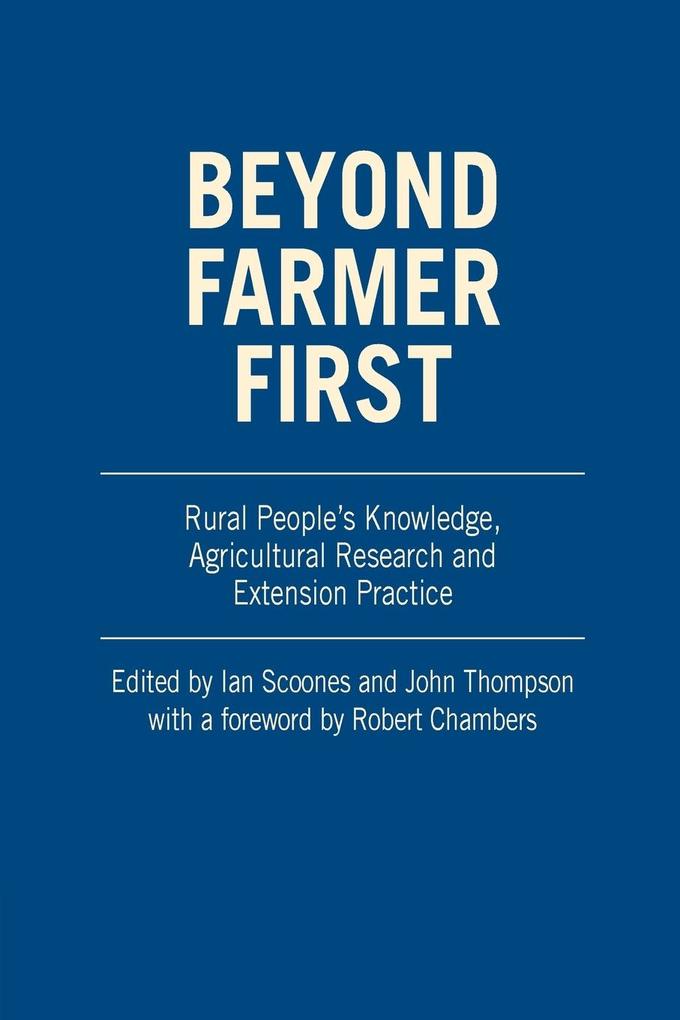
Zustellung: Sa, 05.07. - Mi, 09.07.
Versand in 5 Tagen
VersandkostenfreiBestellen & in Filiale abholen:
The purpose of this book is to reveal how agricultural research and extension, far from being discrete, rational acts, are in fact part of a process of coming to terms with conflicting interests and viewpoints, a process in which choices are made, alliances formed, exclusions effected, and worldviews imposed.
Inhaltsverzeichnis
Part 1 Theoretical reflections on knowledge, power and practice: introduction; knowledge, power and agriculture - towards a theoretical understanding, I. Scoones and J. Thompson; knowledge, consciousness and prejudice - adaptive agricultural research in Zambia, M. Drinkwater; the interweaving of knowledge and power in development interfaces, N. Long and M. Villareal; indigenous management and the management of indigenous knowledge, D. Marsden; "the technicians only believe in science and cannot read the sky" - the cultural dimension of the knowledge conflict in the Andes, M.A. Salas; trees, people and communities in Zimbabwe's communal lands, F. Matose and B. Mukamuri; declarations of difference, J. Fairhead and M. Leach; indigenous soil characterization in Northern Zambia, P. Sikana; agricultural discourses - farmer experimentation and agricultural extension in Rwanda, J. Pottier; composing rural livelihoods - from farming systems to food systems, A.J. Bebbington. Part 2 Methodological innovations, applications and challenges: introduction; acknowledging process - challenges for agricultural research and extension methodology, A. Cornwall et al; participatory watershed management in India - the experience of the Aga Khan Rural Support Programme, P. Shah; challenges in the collection and use of information on livelihood strategies and natural resource management, K. Schoonmaker Freudenberger; developing interaction and understanding - RRA and farmer research groups in Zambia, M. Drinkwater; quality control, method transfer and training, J. Jiggins; the ethics of documenting rural people's knowledge - investigating milk marketing among Fulani women in Nigeria, A. Waters-Bayer; stimulating farmer experiments in non-chemical pest control in Central America, J. Bentley; encouraging knowledge exchange - integrated pest management in Indonesia, Y. Winarto; learning by improvization - farmers' experimentation in Mali, A. Stolzenbach; experimenting farmers in Northern Ghana, D. Millar; local knowledge formation and validation - the case of rice production in Central Sierra Leone, P. Richards; participatory methods and political processes - linking grassroots actions and policy-making for sustainable development in Latin America, L.A. Thrupp et al. Part 3 Transforming institutions and changing policies: introduction; tiwards a learning paradigm - new professionalism and institutions for agriculture, J.N. Pretty and R. Chambers; from research to innovation - getting the most from interaction with NGOs, J. Farrington and A.J. Bebbington. (Part contents).
Produktdetails
Erscheinungsdatum
15. Dezember 1994
Sprache
englisch
Seitenanzahl
318
Autor/Autorin
Ian Scoones, John Thompson
Verlag/Hersteller
Produktart
kartoniert
Gewicht
463 g
Größe (L/B/H)
229/152/17 mm
ISBN
9781853392504
Entdecken Sie mehr
Bewertungen
0 Bewertungen
Es wurden noch keine Bewertungen abgegeben. Schreiben Sie die erste Bewertung zu "Beyond Farmer First" und helfen Sie damit anderen bei der Kaufentscheidung.









